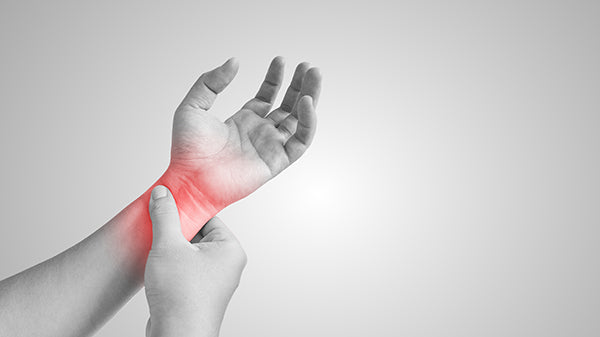
Many diseases occurring in the body damage the nerves that are involved in sensing different stimuli of the environment, and thus, you suffer from what is called neuropathy.
Peripheral nerves neuropathy is a painful condition characterized by severe shooting pain, along with loss of heat and cold sensations, weakness, and numbness, usually in the hands and feet.
Diabetes has been found as the leading cause of peripheral neuropathy. However, peripheral neuropathy can also occur due to any trauma to the nerves, autoimmune diseases, or drug-induced injury, etc.
Neuropathies typically start in the hands and feet, but other body parts can be affected too.
Nerve damage in hand can be very painful and frankly it’s uncomfortable.
First line treatment options consist of physical therapy, over-the-counter pain relievers such as NSAIDS, prescription medications such as gabapentin or your doctor might also recommend steroid injections to reduce inflammation and pain.
If you're not a fan of medicine or haven’t had much success, supplements are an excellent option as they have fewer side-effects and nutritionally support the body.*
We recommend using pharmaceutical grade supplements such as Neurazenx to ensure optimal dosages and better quality.*
Below, we will cover the top 7 researched vitamins to helping treating nerve damage in your hands.
Benfotiamine has been shown to be the best vitamin for nerve growth and healing. It is because benfotiamine inhibits the AGEs (advanced-glycation end-products) formed by non-enzymatic irreversible reactions within the body.
By inhibiting AGEs, benfotiamine protects us from the harmful oxidizing effects of the free radicals generated by AGEs.
Oral supplementation of benfotiamine increases the peripheral nerve functionality and reduces the inflammatory markers in patients with diabetes mellitus type I.
Thus, benfotiamine plays a vital role in protecting the peripheral nerves and brain from the harms of diabetic neuropathy.
Magnesium is typically involved in nerve physiology.
Studies have shown that magnesium supplementation to a patient with a neurodegenerative disorder boosts up the nerve healing process as it possesses anti-inflammatory properties and induces Schwann cells of peripheral nerves to secrete nerve growth factor, ultimately promoting the regeneration of nerves.
Another research study showed the healing properties of magnesium in a patient with sciatic nerve injury.
Alpha-lipoic acid is a potent antioxidant, and a study done on it claims that it seems to delay peripheral diabetic neuropathy or potentially reverses it.
Alpha-lipoic acid increases reduced glutathione in the body, which protects the body from harmful free radicals. The recommend minimum dose of ALA is 600mg per day.
N-acetyl cysteine is a cysteine molecule with an acetyl group attached to it. The best feature of this compound is that it, being antioxidant and anti-inflammatory, is used in treating neuropathic pain and reducing inflammation.
It actually helps promote nerve growth by reducing the oxidative stress caused by free radicals produced inside the body.
A 2009 research study claimed NAC to be best in neuron differentiation and neuritogenesis (sprouting of neurites from a neuronal cell).
Neuronal growth and survival depend upon its aerobic metabolic activity. Acetyl L-carnitine facilitates nerve regeneration by enhancing neuronal metabolism.
Moreover, it doesn’t just increase the number of nerve fibers but also improves the quality of regeneration.
A placebo-controlled trial was performed, which suggested Acetyl L-carnitine can relieve neuropathic pain and improve nerve fiber healing in patients with diabetic neuropathy/small fiber neuropathy.
A research study on the effects of L-arginine supplementation in rats was done, and the results were quite impressive.
L-arginine prevented allodynia and hyperalgesia in painful diabetic neuropathic rats by increasing the blood flow towards the injured area through induction of nitric oxide and agmatine production.
Another 2010 study proved the anti-aging effects of L-arginine. It serves as a precursor for the production of compounds like polyamines, proline, creatine, glutamate, agmatine, and urea.
Moreover, L-arginine reduces cardiovascular risk, erectile dysfunction, and improves immune function, etc. All of these ultimately increase the living period of a person.
Curcumin is a compound found in turmeric, which is an Asian cooking herb. It has been widely known for its anti-inflammatory, antioxidant, and analgesic properties.
Studies have shown that it helps to relieve numbness and tingling sensations occurring in your hand and feet due to several neuropathies.
Curcumin also upregulates a neuronal protein, called S100, thus promoting nerve regeneration. Moreover, curcumin increases antioxidants within the body that help the body heal the damaged nerves fast.
Most of the supplementations nowadays are using curcumin in their formula because of its vast benefits and usefulness.
NeuraZenx is the best all-in-one solution for your neuropathic problem as it has been formulated by podiatrist, pharmacist, and nutraceutical specialists with highly recommended and clinically proven nutrients.*
Most health practitioners would give you a sheet of the vitamins and minerals you need to consume for your neuropathy. Why not have all those supplements within a single package? Why not obtain those with just one pill?
It is also advised to talk to your doctor before starting any supplemental product for treating neuropathy.
If you are ready to try out NeuraZenx for nerve health, you can purchase this supplement straight from Zen Nutrients today: Here.
*These statements have not been evaluated by the Food and Drug Administration. These products are not intended to diagnose, treat, cure or prevent any disease.